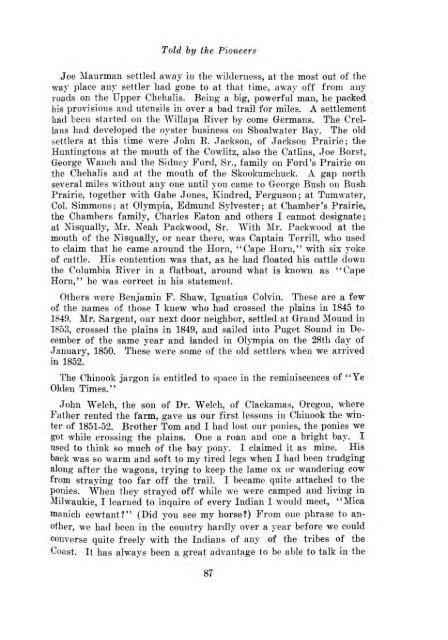Told by the Pioneers - Washington Secretary of State
Told by the Pioneers - Washington Secretary of State
Told by the Pioneers - Washington Secretary of State
You also want an ePaper? Increase the reach of your titles
YUMPU automatically turns print PDFs into web optimized ePapers that Google loves.
<strong>Told</strong> <strong>by</strong> <strong>the</strong> <strong>Pioneers</strong><br />
Joe ::\laurman settled away in <strong>the</strong> wilderness, at <strong>the</strong> most out <strong>of</strong> <strong>the</strong><br />
way place any settler had gone to at that time, away <strong>of</strong>f from any<br />
roads on <strong>the</strong> Upper Chehalis. Being a big, powerful man, he packed<br />
his provisions and utensils in over a bad trail for miles. A settlement<br />
had been started on <strong>the</strong> ",Villapa River <strong>by</strong> come Germans. The Crellans<br />
had developed <strong>the</strong> oyster business on Shoalwater Bay. The old<br />
settlers at this time were John R. Jackson, <strong>of</strong> J acksoll Prairie; <strong>the</strong><br />
Hunting-tons at <strong>the</strong> mouth <strong>of</strong> <strong>the</strong> Cowlitz, also <strong>the</strong> Catlins, .Toe Borst,<br />
George Wanch and <strong>the</strong> Sidney Ford, Sr., family on Ford's Prairie on<br />
<strong>the</strong> Chehalis and at <strong>the</strong> mouth <strong>of</strong> <strong>the</strong> Skookumchuck. A gap north<br />
several miles without anyone until you came to George Bush on Bush<br />
Prairie, toge<strong>the</strong>r with Gabe Jones, Kindred, Ferguson; at Tumwater,<br />
Col. Simmons; at Olympia, Edmund Sylvester; at Chamber's Prairie,<br />
<strong>the</strong> Chambers family, Charles Eaton and o<strong>the</strong>rs I cannot designate;<br />
at Nisqually, Mr. Neah Packwood, Sr. 'With Mr. Packwood at <strong>the</strong><br />
mouth <strong>of</strong> <strong>the</strong> Nisqually, or near <strong>the</strong>re, was Captain Terrill, who used<br />
to claim that he came around <strong>the</strong> Horn, "Cape Horn," with six yoke<br />
<strong>of</strong> cattle. His contention was that, as he had floated his cattle down<br />
<strong>the</strong> Columbia River in a flatboat, around what is known as "Cape<br />
Horn," he was correct in his statement.<br />
O<strong>the</strong>rs were Benjamin F. Shaw, Ignatius Colvin. These are a few<br />
<strong>of</strong> <strong>the</strong> names <strong>of</strong> those I knew who had crossed <strong>the</strong> plains in 1845 to<br />
1849. Mr. Sargent, our next door neighbor, settled at Grand Mound in<br />
1853, crossed <strong>the</strong> plains in 1849, and sailed into Puget Sound in December<br />
<strong>of</strong> <strong>the</strong> same year and landed in Olympia on <strong>the</strong> 28th day <strong>of</strong><br />
.January, 1850. These were some <strong>of</strong> <strong>the</strong> old settlers when we arrived<br />
in 1852.<br />
The Chinook jargon is entitled to space in <strong>the</strong> reminiscences <strong>of</strong> "Ye<br />
Olden Times."<br />
John ",Velch, <strong>the</strong> son <strong>of</strong> Dr. Welch, <strong>of</strong> Clackamas, Oregon, where<br />
Fa<strong>the</strong>r rented <strong>the</strong> farm, gave us our first lessons in Chinook <strong>the</strong> winter<br />
<strong>of</strong> 1851.52. Bro<strong>the</strong>r Tom and I had lost our ponies, <strong>the</strong> ponies we<br />
got while crossing <strong>the</strong> plains. One a roan and one a bright ba~·. I<br />
used to think so much <strong>of</strong> <strong>the</strong> bay pony. I claimed it as mine. His<br />
back was so warm and s<strong>of</strong>t to my tired legs when I had been trudging<br />
along after <strong>the</strong> wagons, trying to keep <strong>the</strong> lame ox or wandering cow<br />
from straying too far <strong>of</strong>f <strong>the</strong> trail. I became quite attached to <strong>the</strong><br />
ponies. ",'Then <strong>the</strong>y strayed <strong>of</strong>f while we were camped and living in<br />
Milwaukie, I learned to inquire <strong>of</strong> every Indian I would meet, "Mica<br />
munich cewtant1" (Did you see my horse?) From one phrase to ano<strong>the</strong>r,<br />
we had been in <strong>the</strong> country hardly over a year before we could<br />
Converse quite freely with <strong>the</strong> Indians <strong>of</strong> any <strong>of</strong> <strong>the</strong> tribes <strong>of</strong> <strong>the</strong><br />
Coast. It has always been a great advantage to be able to talk in <strong>the</strong><br />
87
















